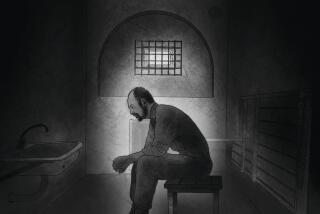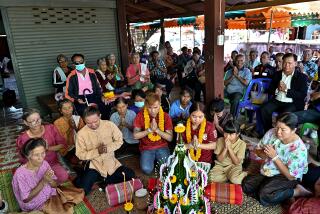PIONEERS : ‘Hostages’ Want Out of Russia’s Far North : Settlers in Communists’ industrialization drive are now victims of cruel economics.
- Share via
VORKUTA, Russia — It is late spring, but the snowdrifts in this coal miners’ city beyond the Arctic Circle still loom higher than the rickety shacks at the edge of town. The Stalin-era prisoners who died by the thousands here are doubly buried--under permafrost and three more feet of glaring snow. As the temperatures drop and rise suddenly, the old suffer palpitations and weakness. The children’s skin looks like yellowed wax.
Raisa Kurdyukova, a teacher here, wishes she could live elsewhere. So too does Olga Andreyutsa, 14, and pensioner Alexander Vorobyov, an invalid after 18 years of underground labor in Vorkuta’s coal mines.
“We are hostages of the far north,” Vorobyov said, blue eyes glowing in the sunlight reflected off the snow. “Especially here in Vorkuta. We believed the government, we believed that we would live better, and now, it’s turned out that we’re poor.”
Drawn by the double and triple salaries offered by a government intent on forced-march industrialization, hundreds of thousands of people under the Communist regime streamed to inhospitable spots like this in the frigid far north, which makes up two-thirds of Russia’s territory. Added to their numbers were hundreds of thousands of prisoners, including at that time, in a camp just outside Vorkuta, author Alexander Solzhenitsyn.
Now, freed of repression and ignored by the government except when the miners strike, the 250,000 residents of Vorkuta are victims of cruel economics. Too poor to move south, they are condemned to open-ended sentences in a small heated oasis among the frozen wastes, much like the labor camp inmates of old.
According to Russia’s biggest independent labor union, at least 2 million of the 10 million residents of Russia’s far north would like to leave. The old advantages of living in the north--high salaries, good supplies and artificially low prices--are all gone in Russia’s wild new economy; the south looks ever more tantalizing.
The government has announced plans to help resettle northern residents. But, to date, only a few thousand families have reportedly migrated south--with little government help.
“Families came here because they heard pay is high, and then they couldn’t leave,” said Olga, who dreams of sunnier climes.
Kurdyukova, a kind-eyed elementary teacher, came to Vorkuta 28 years ago from central Russia by choice, following “a call of the heart.” Now, she said, all she wants is to leave.
“When I came here at 24,” she said, “everything was ahead, everything was in rainbow colors. Now, I have no hope. It’s a no-out situation. All of our savings have gone up in smoke. I’d like to leave here--I was born in central Russia, and I’d like to move back. But here I could sell my apartment for only 2 million rubles, and the cheapest one I could buy in the south is 5 or 6 million. So we’ve become the hostages of politics.”
Valery Melnikov, a welder for the railroad that traverses the tundra to Vorkuta, has concluded that “there just shouldn’t be cities beyond the Arctic Circle.”
The darkness of the polar night that descends for several months is just too much, and he often feels a lack of oxygen. By January’s end, he said, “You feel a kind of endless fatigue.”
When Melnikov first arrived in 1978, “the salary was great compared to the south. Now, in the south it’s better. At least you can have your own garden there. Here, you have nothing.”
Even some of the miners who provide Vorkuta’s reason for being--the dozen coal mines that make big black blotches on the boundless white of the region’s landscape--say they would leave if they could. They earn 150,000 rubles and more per month. That is almost $200, some five times the average salary.
But they say that almost all their earnings go toward food in Vorkuta’s extortionate stores and markets. They can barely afford vacations south anymore, and their salaries are often delayed because of money shortages.
“We live worse than the black miners in South Africa,” complained Anatoly Krakhmal, 35, a mining welder.
More to Read
Sign up for Essential California
The most important California stories and recommendations in your inbox every morning.
You may occasionally receive promotional content from the Los Angeles Times.










